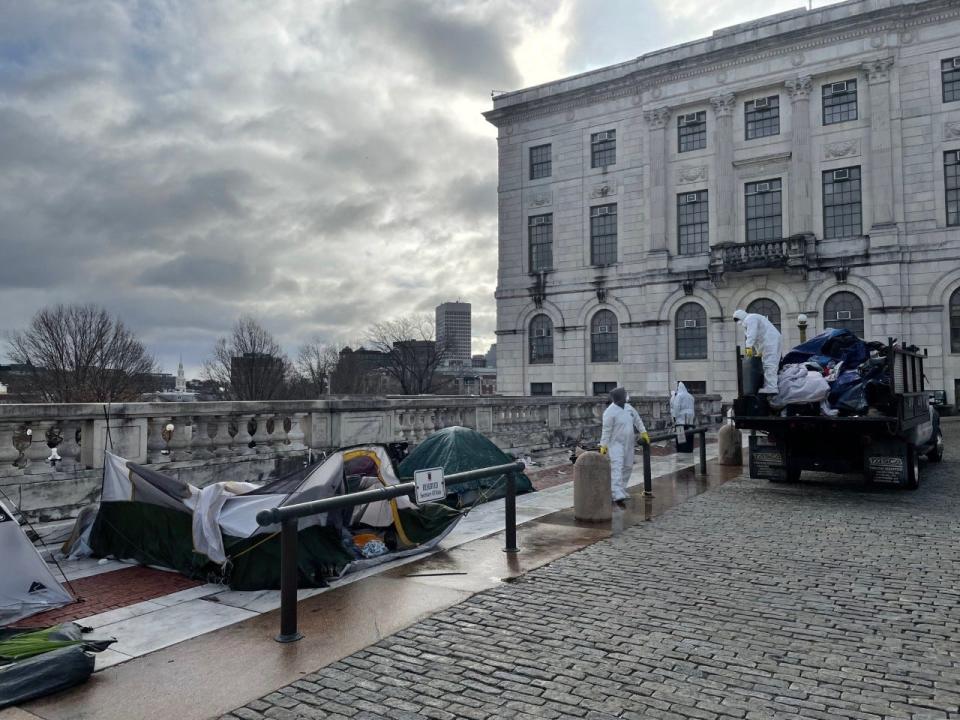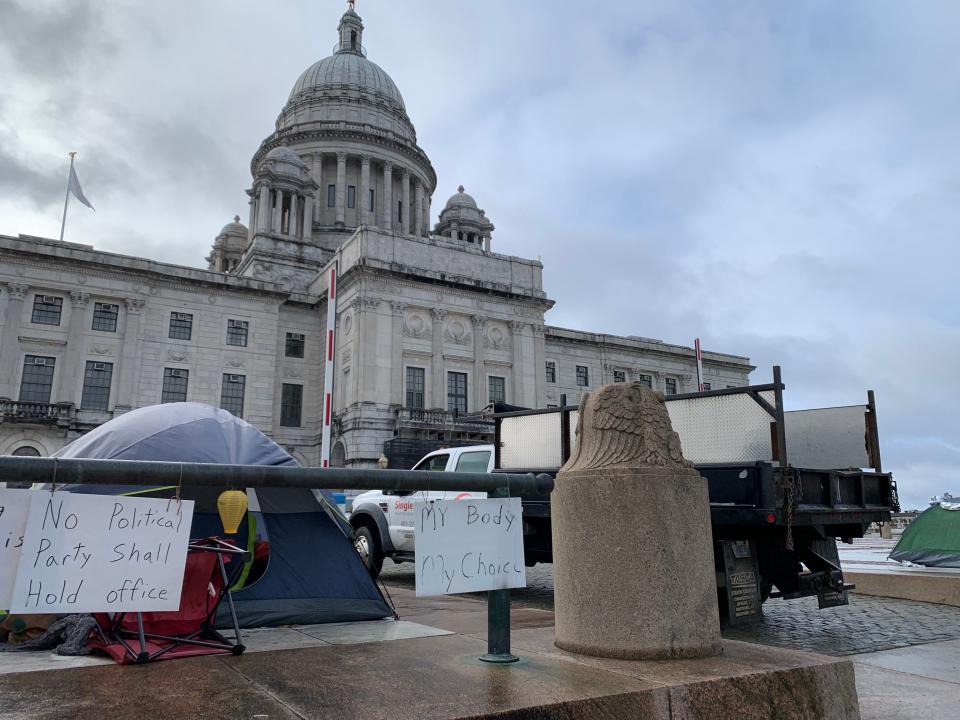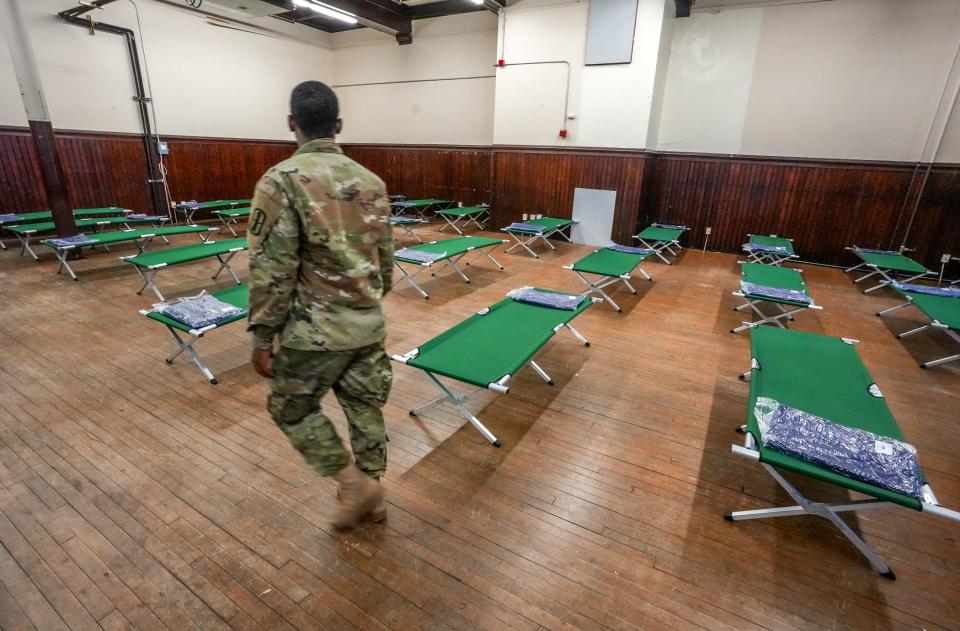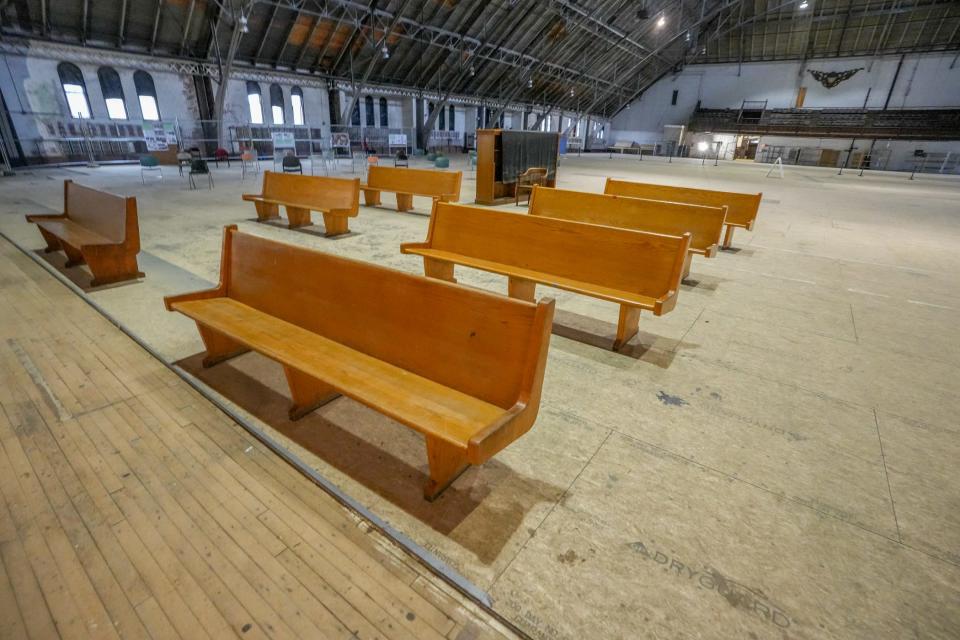State House tent encampment cleared after judge denies bid to block eviction
- Oops!Something went wrong.Please try again later.
PROVIDENCE — Rows of tents that stood at the front door of the Rhode Island State House for months were taken down and hauled away Saturday morning, less than 24 hours after a judge said Gov. Dan McKee was within his power to clear the encampment.
The removal operation began around 9 a.m. after state employees had worked overnight to move the last remaining residents of the tent village to shelters.
By 9:30 a.m., no occupants were visible in the tents or on the marble Smith Street entrance plaza as contractors with disaster cleanup company Single Source put disassembled tents, sleeping bags and mattresses in trucks.

"State employees with the Department of Housing continued to be on site at the encampment last night and transported four individuals to shelter," Matt Sheaff, a spokesman for McKee, said Saturday morning. Lawyers representing encampment residents on Friday had said at that time that four people remained in the tents, which at one point were said to house as many as 50 people.
Housing staff "had a continuous presence at the encampment from 6 p.m. yesterday until the last tent was removed today. This allowed people to continue to pursue shelter solutions and get access to their belongings," Andrea Palagi, McKee's communications director, said in a statement Saturday afternoon. "Since the ruling yesterday, no one has been arrested and no one was in a tent this morning when the cleaning company arrived.”
Superior Court Judge David Cruise on Friday afternoon denied a bid to block the McKee administration from removing the tent encampment on free-speech grounds.
In their bid for an injunction, a group of lawyers representing encampment residents and backed by the American Civil Liberties Union argued that the tents were part of a 24-hour protest in support of homeless Rhode Islanders whose presence on public property was protected by the First Amendment.
Cruise said there were "ample, alternative channels" for the protesters to make their point without sleeping on the State House grounds, and evicting them would not violate their First Amendment rights or the state's own Homeless Bill of Rights.

Focusing on the state's explicit ban on overnight camping on State House grounds, he said the policy is not aimed at any one group and it is "narrowly tailored to serve a significant governmental interest because [both sides] have a substantial interest in maintaining the grounds of the State House in an attractive and intact condition for the public to enjoy."
On Friday evening, the McKee administration opened a new temporary shelter at the Cranston Street Armory on Providence's West Side.
ACLU and Center for Justice 'extremely disappointed' in court's ruling
It was not immediately clear whether the lawyers representing the people remaining in the homeless encampment will appeal his rejection of their bid for an injunction. "We need to more carefully review the judge's [oral] decision ... and talk with the clients," said Steven Brown, executive director of the Rhode Island chapter of the ACLU.

"Technically, the injunction is now dissolved, so the state can do whatever it wants at this point," Brown told The Journal. But "we'd encourage the state not to take any action against the four people who are remaining, but in light of the judge's decision, they have the right to remove them."
More broadly, the ACLU of Rhode Island and the Center for Justice stated: "We are extremely disappointed in the court’s decision. We believe it fails to acknowledge the arbitrary and discriminatory way the state’s policies on overnight protest have been implemented, and makes light of an important state law designed to ensure public input, transparency and oversight over state policy making.
"The plaintiffs have stayed at the State House in freezing weather to make an important point, and it is very unfortunate that the end result is that they now face arrest for doing so."
Timeline of the legal dispute over clearing the encampment
The legal fight began earlier this month as the original Dec. 9 deadline the McKee administration set for the tent dwellers to vacate the marble plaza outside the State House bore down.
Friday's court hearing took place on a day the administration planned to open the Cranston Street Armory at 5 p.m. as a 24-hour, 50-bed "warming station," operated at least initially by the National Guard with cots and medical services available for emergencies. Late Friday, the governor's office announced that Amos House had been given preliminary approval to run the Armory warming station.

By Friday, there were only four plaintiffs remaining in the court fight — Frank Leonard, Gregory Wright, Robert Carmody and Louis Medico — and lawyer Lynette Labinger argued they were entitled to remain on the State House terrace under their First Amendment right to protest — at the seat of government, where they would be seen — the lack of adequate housing in Rhode Island.
She also cited the state's alleged failure to properly adopt the ban on overnight camping at the State House.
But Bart Totten, the private lawyer representing the state, said the state rules for use of the State House grounds and building explicitly ban overnight camping for safety reasons, and there is a litany of court decisions that support the State of Rhode Island's right to enforce this regulation when there is a significant safety concern, even if the state did not go through the paces of the state's Administrative Procedures Act.
During the course of the hearing, Capitol Police Chief Joseph Little confirmed reports of urine, human feces and hypodermic needles on the grounds, and at least one public safety incident on Thursday night about which he did not offer details.
Background: There were around 35 tents on the State House grounds when McKee first ordered the encampment cleared, stating that it had become a public safety hazard.
Advocates for the homeless challenged the eviction in court last week on First Amendment grounds, arguing that the State House was public property and a traditional forum for political speech.
In their words:As tents line the State House plaza, we asked those living in them for their stories
On Wednesday, Superior Court Judge David Cruise, who last week issued a temporary restraining order blocking any tent evictions, continued the case until at least Friday so he could consider a new amended complaint filed Tuesday, with American Civil Liberties Union attorneys now participating in the case.
Among the First Amendment arguments: "Some or all of the Plaintiffs selected the State House grounds because they believe that it is the most effective way to petition the State, and especially the Governor, to use State resources to provide shelter to themselves personally and the unhoused and housing insecure population generally."
RI State House encampment:RI State House encampment: Why it is happening and what solutions are being considered
That same day, lawyers for the state released an affidavit from Joseph Lindstrom, who was hired by the McKee administration last month, detailing his work in recent days to help residents of the State House encampment, including the 25 named plaintiffs in the lawsuit.
Lindstrom said that over that time, he spoke with 10 of the plaintiffs at the encampment and 14 more people living there who were not in the suit. The rest of the plaintiffs, he said, he could not locate or they were staying in a shelter or living somewhere else.
He offered a shelter bed to all of the people at the encampment and seven accepted, according to the filing, but most declined.
How many homeless people are living in Rhode Island?
The number of unhoused Rhode Islanders was 509, as of the latest two-week count conducted by the Rhode Island Coalition to End Homelessness. The count reflects people living outdoors, in a tent, in a car, or perhaps in a place with no heat and/or running water.
The number of people on a waiting list for shelter was 594.
The number of available shelter beds has been elusive. When he was asked on Friday, McKee's spokesman, Matt Sheaff, said: "Two weeks ago we announced 75 additional shelter beds, [bringing] the total number of new shelter beds funded in 2022 to 351.
"With these new shelter beds, the Department of Housing expects the statewide shelter capacity to include more than 1,000 operational beds," Sheaff said. (The number does not include the cots at the Armory.)
Stuggling to find a home:Number of older Rhode Islanders asking for help to find housing growing, group says
On Thursday, the state's housing secretary, Josh Saal, sent a letter to the Rhode Island Coalition to End Homelessness — which is under state contract to oversee the waiting list for shelter beds — in which he requested the location of 80 or so rumored homeless encampments across the state, and the waiting list of those who are waiting for shelter beds as of Dec. 14. It is not yet clear whether he has gotten a response.
For the record: McKee, the governor, and Cruise, the judge, are second cousins and childhood friends.
Staff writer Alex Kuffner contributed to this report.
This article originally appeared on The Providence Journal: State House encampment cleared after judge refuses to block eviction

